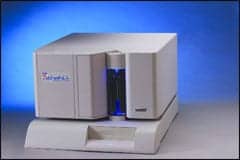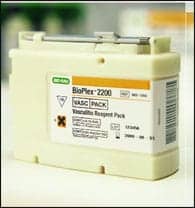 |
For individuals with autoimmune diseases, obtaining a proper diagnosis can feel like an insurmountable challenge. A recent survey, conducted by the American Autoimmune Related Diseases Association (AARDA), revealed that the majority of patients eventually determined to have serious autoimmune diseases had significant problems getting the correct diagnosis; many were incorrectly determined to have a variety of conditions that have no specific blood test.
With more than 80 types of autoimmune disease, including Graves’ disease, rheumatoid arthritis, lupus, and celiac disease, it’s no wonder that physicians have a difficult time. According to the AARDA, approximately 75% of those who suffer from autoimmune conditions—in which the body mistakenly attacks its own cells—are women, and the organization estimates that this category of disease is among the top 10 leading causes of death in women up to 65 years of age. Symptoms range widely and include swelling and damage to the joints, skin, kidneys, heart, lungs, blood vessels, and brain; weakness and pain in the muscles; heat sensitivity; and infertility.
So why is such a debilitating disease so hard to diagnose? Primarily because there is no gold standard—no one perfect test that can be held up as an exemplar and that can be trusted to provide the correct outcome.
Lab Test a Piece of the Puzzle
“Autoimmune testing is unique in that there is not a straightforward method to diagnose patients,” says Chris Howard, Msc, of Inverness Medical Professional Diagnostics, San Diego. “The lab test serves as just a piece of the puzzle, in conjunction with many other factors. The diagnosis is not black-and-white—the doctor cannot administer a test and determine that the patient is infected with X.”
Autoimmune disorders are diagnosed, evaluated, and monitored through a combination of autoantibody blood tests, blood tests to measure inflammation and organ function, clinical presentation, and through nonlaboratory examinations such as x-rays. The autoantibody blood tests have relied mainly on a manual process and do not feature multiplexing.
For many years, the technology of choice has been the immunofluorescent antibody analysis (IFA)—a sensitive, but subjective, largely manual method that depends on qualified and trained individuals for analysis. Multiple variables, such as quenching, microscope bulb age, and eye fatigue, can affect the final interpretation and result. Indeed, one of the primary autoimmune tests—antinuclear antibody (ANA)—is not standardized, even after decades in a clinical environment.
According to Howard, marketing manager for the AtheNA Clinical Products Group, the ANA test has many challenges, including an increased incidence of positive results as the population ages, without symptoms or clinical presentation.
Performing the INF manually is very labor intensive, says Ginger Weeden, CLS, MT, autoimmune product manager at Bio-Rad Laboratories, Hercules, Calif. “Laboratories that have been performing this testing over the decades have great skill,” Weeden says. “But to attain that level of expertise requires years at the microscope. With a shortage in the laboratory labor force, it is difficult to find laboratorians with the expertise, and it is very time-consuming to train inexperienced laboratorians on the job.”
Bio-Rad’s BioPlex 2200™—the one and only random access multiplexing instrument on the market today—addresses these issues, producing a number of results with a minimum of labor. It allows the laboratory to produce many more results at a reduced turnaround time and with greater precision than either IFA or enzyme immunoassay (EIA) testing, according to Weeden. With the multiplexing technology, the ANA screen result is a compilation of results to the individual analytes that represent the screen (antibodies to dsDNA, SSA, SSB, Sm/RNP, Ribosomal P, Centromere B, Jo-1, Scl-7, and chromatin). The instrument releases only the results that have been ordered, retaining the others in the database where they can be retrieved at a later date.
“We wanted to create a product that would save labor and still provide better and faster information to the clinician,” Weeden says. “With BioPlex 2200, the lab is capable of providing more information to the physician to aid in the diagnosis.”
Performed on blood plasma or serum, the test provides results for the first panel after 45 minutes, with additional panels being produced every 36 seconds thereafter. Reference and core labs use the device, which also tests for Epstein-Barr, vasculitis, and syphilis.
 |
| AtheNA Multi-Lyte Test System |
Objective Measurements Add to Diagnosis
According to Howard, Inverness offers the most complete line of technologies and markers for the evaluation of autoimmune diseases. The test menu spans the technologies used in the clinical lab, from IFA to enzyme immunoassay (ELISA), and its newest addition, the AtheNA Multi-Lyte test system. This product offering allows the lab to fully automate autoimmune test requirements, as well as removes the IFA subjectivity and replaces it with more objective results. According to Howard, the AtheNA test menu is the broadest in the diagnostic market for autoimmune testing, and includes ANA, autoimmune vasculitis, TPO/Tg, and rheumatoid factor testing.
“The replacement of subjective tests with objective measurements provides the physician with a more specific answer to aid in patient diagnosis,” Howard says.
The AtheNA system provides an objective measurement for each test within the well, meaning that overlapping disease states will be discerned. Further, the test system performs the ANA screen at the same time that it tests the nine individual ENA markers in the same well, which reduces the turnaround time to the physician and eliminates the need for patients to have blood redrawn for specific ENA marker testing at a subsequent visit. This also eliminates the need to thaw frozen samples, which prevents the freeze-thaw degradation of antibodies in patient sera.
 |
| BioPlex 2200 |
“We wanted to produce a product with better specificity to help the patient, as well as remove subjective results and provide the lab with an easier way to test for autoimmune diseases and automate the process,” Howard says. The test is performed on blood serum, and the turnaround time can be just over an hour, depending on the number of tests run at a time. While AtheNA is more costly than traditional ELISA devices, the customer base includes more than 200 placements and covers the hospital labs of serology or immunology departments, clinical reference labs, and group rheumatology practices.
ELISA Tests
The ELISA-based products offered by Genesis Diagnostics, Cambridgeshire, UK, which include tests for rheumatoid arthritis and connective tissue diseases, have a strong reputation for reliability and simplicity of use, according to its managing director, Michael Walker, PhD. Tests are done on blood serum or plasma, usually take 1 hour to perform, and are utilized in labs around the world.
“Users choose Genesis because of these factors,” Walker says. “And because we have competitive pricing and excellent customer service.”
SQI Diagnostics, Toronto, and The Binding Site Inc, San Diego, have new diagnostic products currently undergoing the rigors of the FDA-clearance process. The Binding Site’s Modified Gliadin Peptide IgA and IgG kits, which test for celiac disease, address the problem of antigen sources to provide greater specificity and sensitivity, and thus, more accurate results. They utilize standard ELISA procedures, and full automation is provided on the DSX and ESP600 microplate processors.
Celiac disease is a small bowel enteropathy characterized by a gluten sensitivity and resulting in chronic inflammation of the small intestine. According to the National Institutes of Health, the disease may affect as many as three million Americans.
The Modified Gliadin Peptide assay complements tissue transglutaminase assay (tTG) and endomysial antibody, the most traditional methods of testing for celiac disease. Testing a panel offers maximum sensitivity and specificity.
“Most antigliadin assays use a crude gliadin (a glycoprotein that is a subfraction of gluten and the component in gluten cereal grains most closely linked to celiac disease) extract as an antigen source,” says The Binding Site’s marketing manager, Gary Tremain. “While gliadin has a role in celiac monitoring and detection, this class of tests lacks the accuracy of a tTG. Our new modified gliadin peptide antigen source provides significantly improved sensitivity and specificity over extract antigen sources.
“So much of the diagnosis depends on the antigen source, and many are not pure. Peptides provide better control for manufacturing and in the kits themselves,” Tremain says.
The enzyme tissue tTG can modify gliadin peptides, causing deamidation of glutamine to form glutamic acid residues. These modified gliadin peptides are crucial to the toxic mechanism of celiac disease and enhance the immunogenicity of gliadin, provoking an immune response. While antitissue transglutaminase (tTG-IgA) remains the most sensitive and specific assay, in some populations, such as children and celiac patients with less villous atrophy, tTG-IgA may not be detected, but antigliadin will be. Gliadin antibodies are also a valuable marker for monitoring patient adherence to a gluten-free diet, a crucial component for controlling celiac disease.
In addition, according to Tremain, antigliadin IgG antibody determination is an important marker for the identification of celiac patients who are IgA deficient, which is 10% to 15% higher in celiac patients than in the general population.
“Therefore,” Tremain says, “antigliadin IgG becomes an important diagnostic tool by detecting celiac patients not producing IgA antibodies that would be missed if they were tested for only tTG-IgA and gliadin antibodies.”
At press time, The Binding Site expects to announce FDA clearance at any moment.
Multiplexed Assays
SQI Diagnostics has received positive results from external multisite validation studies at Mount Sinai Hospital in Toronto, and The Cleveland Clinic, for its SQiDworks™ automated platform. SQiDworks, a fully automated fluidics workstation, scanner, and analytical device, is used to analyze multiple biomarkers in a fully automated load-and-go process. It uses SQI Diagnostics’ proprietary QuantiSpot microarray test devices and fully integrates all assay steps for hands-free workflow, and it is compatible with standard lab automation systems.
The lead test for the platform is the QuantiSpot RA assay, which provides simultaneous analysis of four biomarkers commonly prescribed to aid in the diagnosis and monitoring of rheumatoid arthritis, including the anti-CCP-IgG marker that has been adopted over the last 5 years. The platform is capable of processing up to 240 patient samples per run and—when combined with the company’s QuantiSpot multiplexed tests—can produce quantified determinations for up to 960 individual test results per hour.
“From one very small blood sample, you can get four analytes determined for one disease,” says Andrew Morris, CFO of The Binding Site. “This is a multiplexing technology that tests for the multiple biomarkers (IgG, IgA, and IgM) of the same antigen, which is the core of autoimmune disease testing. This results in significant lab efficiencies and cost savings.”
According to CEO Claude Ricks, SQiDworks automation and QuantiSpot multiplexed assay provides hospitals and labs the opportunity to deliver the same clinical results in one test per patient with significant savings in lab technician labor and reagent consumption.
 To stay current on testing for autoimmune diseases, bookmark our website. |
“The validation results demonstrated that the product performed consistently at all sites at a level equivalent to the performance of US FDA-approved manual diagnostic devices. The data shows that the SQiDworks platform is equivalent in clinical performance to existing technologies, yet provides automation and multiplexing. The sensitivity and specificity were determined by comparing the QuantiSpot test results to known patient samples.
“This is the final major piece of performance data on our platform that is required for our applications to the FDA,” Ricks says.
The data collected from these studies, together with internal trial data, will be used in SQI Diagnostics’ 510(k) application to the FDA.
Shannon Rose is a freelance health and medical writer based in Temecula, Calif.





